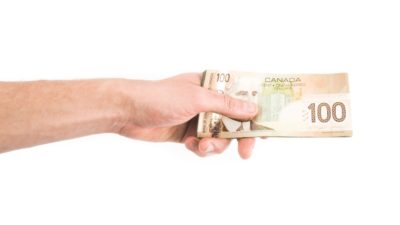The Canada Emergency Response Benefit (CERB) has helped many Canadians who have suffered job losses during the COVID-19 pandemic. However, one of the limitations of the program is that because the goal was to get payments out as quickly as possible, there wasn’t a verification process to ensure all recipients who received the payments were eligible for them. That’s led to many people receiving CERB payments even if they aren’t eligible.
Many Canadians have already paid back CERB payments they’ve received. As of June 3, the Canada Revenue Agency (CRA) states that as many as 190,000 Canadians have already had to repay CERB payments due to ineligibility. And the number of tips the CRA’s received relating to fraudulent claims has risen from 600 on June 1 to 1,300 by June 10.
Mistake in claiming CERB could be costly
Paying the CERB payment back now rather than waiting for the CRA to call is a safer move to make as it’ll lessen the chance that the money’s been spent by the time the CRA comes calling for it. And there’s a danger that paying back CERB may not be the only consequence Canadians may have to worry about.
There was a bill in the House of Commons that would’ve penalized fraudulent CERB recipients with fines that could exceed $5,000 and possibly lead to jail time. Although the bill didn’t get enough support, it’s a sign the government may be looking at stiffer penalties for people who are making fraudulent CERB applications.
The government has hinted that it would go after those who applied for CERB knowing they weren’t eligible for it. However, it wasn’t clear whether that would happen.
Some of the reasons Canadians may not be eligible for CERB include going back to work and making in excess of $1,000 during an eligibility period, quitting a job voluntarily or refusing to go back to work, or receiving benefits through another federal program while also receiving CERB payments.
If you’re not eligible for CERB or want a way to further boost your income, you may want to consider investing in stocks.
Using your Tax-Free Savings Account can help you generate tax-free income
One of the downsides of CERB is that the payments are taxable. But if you hold TSX stocks in a tax-free savings account (TFSA), the good news is the income you earn in the TFSA isn’t taxable.
A stock you may want to consider putting in your TFSA is Bank of Nova Scotia (TSX:BNS)(NYSE:BNS). It’s a Big Five bank, so you know it’s going to be a reliable, long-term investment that you can hang on to for years and years.
What’s attractive about bank stocks right now is that because they’re down this year, their yields are up. Scotiabank currently pays its shareholders a quarterly dividend of $0.90, which at a price of around $60 would mean you’re earning a yield of 6% per year.
If you can buy the stock at a lower price, your yield will be even higher. Bank stocks may struggle during the COVID-19 pandemic but like the economy, they’re likely to emerge even stronger once it’s all over.
Meanwhile, by buying right now, you’ll secure a low price and great yield, setting yourself up for some great returns later on.








